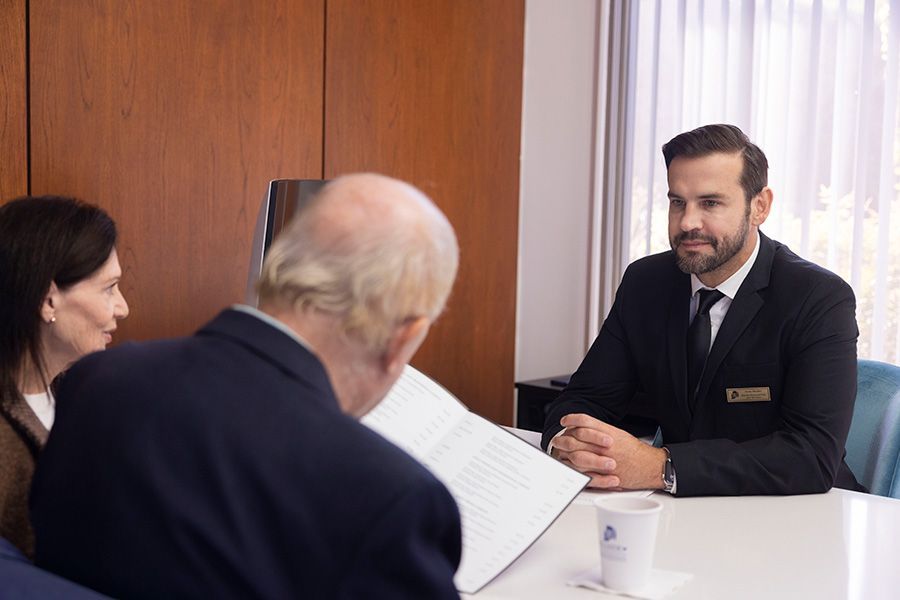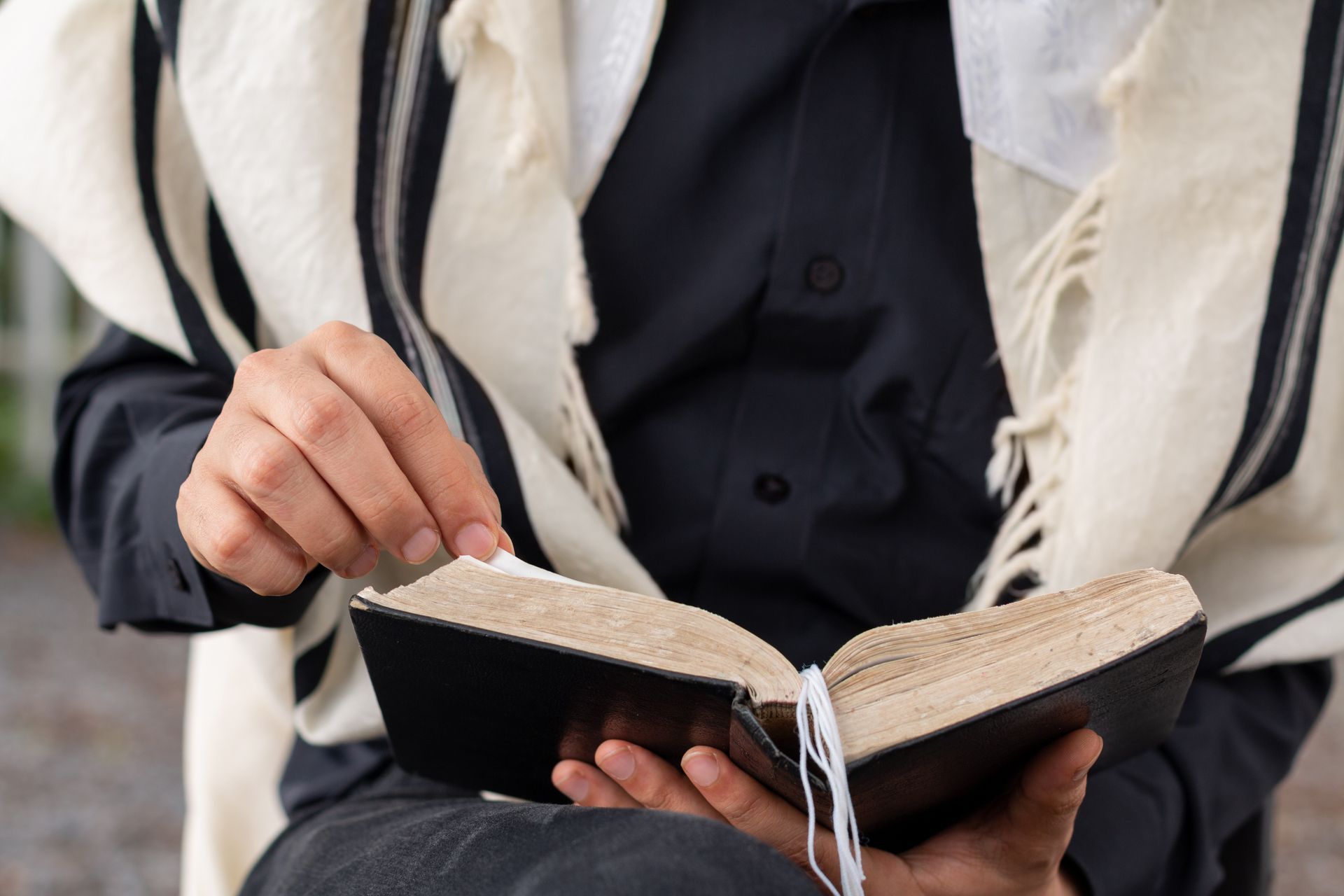The Hillside Blog
Blog
Every month, Hillside Memorial Park and Mortuary shares reflections on Jewish traditions, grief, our services, and other important topics. Explore our most recent articles to learn more and stay up to date on new developments.

April 24, 2025
Memory is not just a theme in Jewish tradition—it is the foundation. In a culture rooted in continuity, story, and sacred responsibility, memory becomes the bridge that connects generation to generation across time. It is how we honor the past, navigate loss, and strengthen our future. We recently spoke with Rabbi Cantor Alison Wissot, a Rabbi at Temple Judea, about the spiritual and cultural weight of memory in Jewish life. Rabbi Cantor Wissot serves on the board of Rabbis United (a branch of StandWithUs) and AKLA, and is an active member of the Cantors Assembly, American Conference of Cantors, and the Central Conference of American Rabbis. She will also lead our Mothers’ Day Remembrance Service at Hillside Memorial Park and Mortuary on Sunday, May 11th at 10:00AM in our Sanctuary. Here, she reflects on how memory shapes Jewish mourning practices, personal rituals, and the resilience of our people. Memory as a Collective Inheritance “Judaism isn’t just a religion—it’s a people,” Rabbi Wissot reminds us. And what binds a people together across time and place? Memory. From ancient Torah commandments to modern Yizkor services, Jews are taught to remember—not only the past but those who carried our stories forward. “There’s a passage in the Torah that commands us to retell our stories,” she says, “even if there’s no one left who remembers them firsthand. When we do this, we’re not just connecting to the living—we’re connecting to the generations who came before us.” In Jewish culture, memory affirms that every life is irreplaceable. “The opposite of holy isn’t the profane, it ‘everyday’ mundane.” Rabbi Wissot explains. “The metaphor we use is kadosh or life versus chol which means sand in modern Hebrew because in the desert, everything is uniform. But each life is distinct, uniquely enriching, and holy. When we remember someone, we’re honoring that uniqueness—and through that, we reaffirm our peoplehood.” “May Their Memory Be a Blessing”: A Phrase of Presence The familiar phrase “May their memory be a blessing” is far more than a platitude. “It means that what you carry from a person—their love, values, and wisdom—should bring good into your life,” Rabbi Wissot says. “Their presence in your life isn’t over.” In practice, this blessing invites the mourner to integrate the best of their loved one into their own journey. “At first, all you feel is pain. But as time passes, the memories return—and they can make you laugh or miss them. That’s how you know they’re still present.” It’s also a phrase that helps others show up. “When someone doesn’t know what to say, this gives them a way to offer love and acknowledgment. It’s a stepping stone to deeper support.” Jewish Mourning as a Journey Through Time One of the most powerful ways Judaism transforms memory into healing is through time—structured, intentional, and sacred. “You can’t go around grief,” Rabbi Wissot explains. “You have to walk through it.” From the immediate moments after death to the yearly yahrzeit (anniversary), Jewish mourning practices offer stages of remembrance: Aninut: The initial period between death and burial, when the mourner is not obligated to anyone but the deceased. Shiva: A week of deep mourning, when the community surrounds the mourner with food, company, and space to remember. Sheloshim: The next 30 days, a gentle reentry into daily life while continuing to observe and reflect. Eleven Months of Kaddish: For parents, this extended period of daily prayer offers time to process, remember, and honor. “These rituals give you permission to remember,” she says, “and permission to feel without shame or pity. It’s a structure that walks with you out of the valley of the shadow of death.” Mourner’s Kaddish: A Communal Act of Love The Mourner’s Kaddish is one of Judaism’s most iconic prayers—yet it doesn’t mention death at all. Instead, it praises life, creation, and the Divine. “That’s its power,” says Rabbi Wissot. “When you’re in mourning, you’re reciting words of life. It’s the antidote to despair.” Saying Kaddish is also a profoundly communal act. “You can’t say it alone. You need a minyan, a group of ten. In that way, it tells you: even in grief, stay connected.” The physical act of bowing during Kaddish can also be a moment of reflection. “An idea I first heard from my friend Rabbi Dan Moskovitz is the idea that during Kaddish you take a step back as if to see what the world is like without you, and then a step back in to reclaim your place in the world.” Personal and Communal Ways to Remember Memory lives not only in prayers but in names, traditions, and the stories we tell: Naming: In many Jewish traditions, babies are named after loved ones who have passed. “It’s a way of saying, ‘May this child carry the values and spirit of someone we cherished.’” Yahrzeit and Yizkor: These annual and festival-based remembrances allow individuals to reflect with the support of the community. Storytelling: Simply telling a story—especially in front of others—brings the person’s memory into the room. “We’re part of a chain,” Rabbi Wissot says. “Every time we say someone’s name, quote their words, or light a candle in their honor, we keep them in that chain.” Creating Meaningful Remembrance Today For those unsure of how to begin, Rabbi Wissot offers gentle advice: “Show up in the community. Explore what traditions are available to you. You don’t have to do everything at once. Maybe start by going to Shabbat. Try something more than once before deciding if it works for you. Let it unfold slowly.” And most importantly, don’t walk the journey alone. “Talk to a rabbi or cantor. Talk to someone who knows. These rituals are meant to hold you.” In Jewish tradition, memory is more than recollection—it is ritual, resistance, and renewal. It is how we honor our losses and how we hold onto life. It binds us to one another, to our past, and to our shared future. If you're seeking ways to create meaningful remembrance in your family, consider speaking with a rabbi, attending a Yizkor service, or simply telling a story. Memory is our inheritance—and our gift to the generations yet to come. If you have recently lost a loved one and need a Rabbi for an upcoming funeral ceremony, Hillside Memorial Park and Mortuary is ready to assist your family in finding someone who matches your family’s preferences and traditions. Please don’t hesitate to reach out on our site or at 800-576-1994 for assistance from our compassionate staff.

March 7, 2025
Planning a funeral involves more than choosing a casket or a service. Numerous legal concerns come into play, many of which people aren’t aware of until they are faced with the situation. It’s completely normal not to know what these legal requirements are, but understanding them in advance can help ensure everything is handled smoothly. This guide will walk you through some of the most important legal considerations accompanying funeral planning. Is There a Will? Are There Preplanned Funeral Arrangements? A will often includes funding and plans for funeral services. If such a will exists, it’s important to determine how detailed it is regarding funeral expenses. Some individuals make prepaid arrangements covering caskets, burial fees, or cremation costs. Funeral homes will honor prearranged plans, though families may need to verify records, especially if arrangements were made in advance of need. Navigating the legal landscape of funeral planning takes time, and trying to handle everything under tight constraints can lead to rushed decisions. Planning ahead is the best way to avoid overspending, underspending, or making uninformed choices. Deciding ahead of time reduces financial strain and ensures the deceased’s wishes are honored. When preplanning isn’t possible, funeral homes will assist families in making legally sound arrangements in a short timeframe. Who Can Make Funeral Arrangements? Even when a person leaves a will specifying their funeral wishes, funeral homes must follow instructions from specific parties with the legal authority to make funeral and burial decisions. Those parties are specified by law and have authority in the following order: A person may make his or her own pre-arrangements with the funeral home and cemetery of their choice. Agent in a power of attorney for health care Next of Kin: The closest legal relative, specified by law. Spouse, children, parents, siblings, etc. Conservator: A court-appointed individual can make pre-arrangements for the conservatee, but only has authority after the death if there are no blood relatives and no agent in a health care power of attorney. Choosing a clear decision-maker isn’t just necessary for the funeral home. This authorized arbiter helps families avoid disagreements over sensitive decisions during an already emotionally taxing time. How Will Funeral Expenses Be Covered? Prepaying funeral expenses is often the best way to pay for a funeral, as it allows payments to be spread out over time without interest. Some funeral homes partner with nonprofit organizations to provide financial assistance to families in need. Special hardship rates may also be available in cases involving the loss of a child. Exploring financial assistance options early can help ease the burden that comes with deciding how to pay for these arrangements. Life insurance policies may also cover funeral expenses, either through direct payments or assignments on funds. In an assignment on funds, the beneficiary directs a life insurance company to pay part of the policy directly to the funeral home. It is important to note that some mortuaries, including Hillside Memorial Park and Mortuary, do not accept assignment of funds, and funeral services sometimes take place before insurance payouts can be processed, which can complicate matters. Understanding how and when these funds are available is crucial. Which Legal Documents Are Needed? Several key documents may be required for funeral planning and handling affairs after death: Durable Power of Attorney/Advance Health Directive: Grants authority to make funeral and burial decisions. Trust Documents: apply when cemetery property has been placed in a trust. Will: May contain specific funeral directives. Military DD214 Form: Necessary for scheduling a burial in a national cemetery, obtaining a burial flag, and arranging additional military honors like a 21-gun salute. Which of these documents you need depends on your specific legal and personal circumstances. If you are not sure which documents you need to honor the wishes of your loved one, your Family Service Advisor may be able to assist you in identifying which you need. Notifying Relevant Organizations One of the most important steps after a death is notifying relevant organizations to secure documents like death certificates, military discharge papers, and other relevant documents. It’s crucial to obtain enough copies to send to agencies such as: The Social Security Administration (to halt benefits and apply for survivor benefits if applicable) Veterans Affairs (for burial flags and military honors) Life Insurance Providers (to process claims) Employers (should they require notification of the passing) Funeral directors can help assist in obtaining these documents efficiently, although it is up to survivors to distribute them. Are There Laws About the Disposal of Bodies? Laws regarding body disposition vary by state. In addition to respecting the deceased’s wishes as outlined in their will, legal regulations must be followed for cremation, burial, or other methods of body disposal. Some states require written authorization for cremation or detailed coordination for burials. Mortuaries and funeral homes must adhere to state-specific guidelines to ensure compliance. What Are the Legal Responsibilities of the Funeral Home? Funeral homes have legal obligations to provide transparency and fairness in their services. These include: Itemized Price Lists for services and products, ensuring families understand costs upfront. Cemetery Pricing to outline burial expenses. Statements of Purchased Items so families know exactly what they are paying for in advance or at the time of need. Federal and state laws require funeral homes to be upfront about costs, and families should always request a written statement before making any financial commitments. Looking Ahead Planning a funeral involves many legal considerations, and being prepared can make a difficult time more manageable and prevent unnecessary stress during a sensitive time. While funeral homes assist with these processes, having a clear legal plan in place is the best way to ensure a smooth and respectful farewell for your loved one. Whether you are in the beginning, middle, or end of your journey planning the funeral, it is best to call one of our advance planning advisors for education and information for the duration of the process. Don’t hesitate to reach out on our site or at 800.576.1994.

March 7, 2025
Preplanning your funeral is one of the most compassionate decisions you can make for yourself and your loved ones. While it may feel uncomfortable to consider, making arrangements in advance alleviates stress, reduces financial burdens, and ensures that your final wishes are honored. As you begin the process, we hope this guide helps you understand the benefits of preparing early for yourself and your family. Benefits of Preplanning Your Funeral for Family and Survivors While thinking about our own passing is difficult, it is important to remember that the loss of a loved one is an emotionally overwhelming experience. Planning a funeral in the midst of grief can add unnecessary stress. By planning in advance, your family doesn’t have to guess what you would have wanted. This prevents disagreements over burial or cremation choices, memorial services, and other significant decisions that go into creating your legacy. Making funeral prearrangements also prevents financial missteps. Without clear guidance, families may overspend or underspend, either feeling obligated to purchase extravagant options or struggling to make economical decisions that still honor their loved one. Perhaps most importantly, making arrangements in advance allows your family to focus on grieving. The burden of guessing your preferences and coordinating logistics can detract from the essential emotional process of mourning. Preplanning removes these uncertainties and allows your loved ones to focus on healing. Financial Benefits of Preplanning Your Funeral Funeral costs can be significant, and preplanning provides financial relief in multiple ways. First, planning and paying in advance mitigates the financial strain on your loved ones. When major expenses are taken care of in advance, family members are only responsible for incidental costs, making the financial impact far more manageable. In addition, many funeral homes offer payment plans that allow you to spread the cost over time, preventing a sudden, overwhelming expense at the time of need. This is especially true because cemetery property, burial services, and cremation fees tend to increase over time as more spaces are taken. Prepaying ensures you are not subjected to rising costs due to inflation or limited availability. How Preplanning Helps Honor Your Final Wishes Planning your funeral in advance ensures that your final wishes are carried out exactly as you intended. The peace of mind that comes with knowing your arrangements are in place cannot be overstated. Securing burial sites and memorial spaces is one primary concern. Many people find comfort in knowing where they will be laid to rest and how their farewell will be conducted. Since highly sought-after spaces may become limited, preplanning ensures your preferred location is secured, preventing any last-minute complications. Many people who begin the preplanning process are pleasantly surprised by how therapeutic it can be to share your final wishes. It is also crucial to communicate your choices with your loved ones as executors of your will. Family members may have feelings or concerns about your preferences, and discussing them openly allows for adjustments or additional personal touches that make the arrangements even more meaningful. Many families find solace in enhancing or personalizing prearranged services to create a more meaningful tribute to their loved ones. Engaging in open discussions about funeral planning ensures that your wishes are not only honored but also cherished by those who hold you dear. Preplanning Your Funeral is an Act of Love Preplanning your funeral provides clarity, financial security, and emotional relief for both you and your family. By addressing these decisions in advance, you eliminate stress, prevent family disputes, and ensure that your final wishes are honored with dignity and care. While it may not be an easy topic to consider, taking control of these arrangements now is one of the most meaningful ways to support those you leave behind. Take the first step today. Our Advance Planning Advisors are ready to help you begin the preplanning process. To schedule an appointment, reach out through our site or call us at 800.576.1994.

March 4, 2025
Beyond creating financial security, Estate Planning can help ensure your wishes are honored and your loved ones are cared for, even after you’re gone. One of the most overlooked aspects of estate planning is how it impacts funeral preparations. A well-structured estate plan can provide clarity, prevent unnecessary legal struggles, and give your family peace of mind during an already difficult time. First Priority: Avoiding Probate Probate is a legal process designed to handle the affairs of a person’s estate after their passing. In California, the probate procedure can be time-consuming and costly, and delay distribution to loved ones, making it difficult to access funds which could be used for funeral preparations and other incidental costs. Even if your estate goes through the probate process, a will with a named executor ensures your affairs are handled according to your wishes. Distributing Assets: Who Inherits What? A crucial part of estate planning is ensuring your assets are fully accounted for and distributed according to your wishes. Consider the following: What assets do you own? Savings, checking accounts, real estate, businesses? Who do you want to inherit your assets? Have you set them aside for a funeral? Who will manage your estate and be responsible for distributing it in accordance with your wishes? By having a clear, up-to-date will or trust, you ensure that your assets pass to the right people without unnecessary legal complications. A trust is particularly useful for maintaining privacy and expediting the distribution process. Caring for Loved Ones: Ensuring Their Well-being For those with children, estate planning takes on an even greater significance. Naming a guardian for your minor children ensures they are cared for by someone you trust. Additionally, you can outline when and how your children should receive their inheritance, preventing financial mismanagement and ensuring long-term security. Beyond financial concerns, estate planning minimizes conflicts between heirs. The absence of a clear plan can lead to disputes, causing unnecessary emotional and financial strain on family members. By making your wishes legally binding, you create a roadmap that prevents misunderstandings and disagreements. Final Wishes: Defining Your Legacy A healthcare directive is a critical component of estate planning. It provides guidance on your crucial healthcare preferences in the event you become incapacitated and may include how you want your remains to be handled (autopsy preferences, burial, cremation, donation, etc.). You also can appoint an agent of your choice, whether related or not, to carry out your wishes. In California, your health care agent also has the authority to direct the disposition of your remains, or to follow through with any funeral prearrangements you may have already made. Having these details documented takes the burden off your family, allowing them to focus on grieving rather than making difficult decisions. It also ensures that your final wishes are respected by preventing potential disagreements among loved ones. Estate Planning: A Gift to Your Family While we cannot offer legal advice, we hope this article helps you begin the crucial conversations now—whether with an estate planning attorney or with your family. Doing so is an important step towards providing clarity and peace of mind for all parties. With a well-thought-out plan in place, you can leave a legacy of organization, care, and consideration, allowing your loved ones to focus on what truly matters: honoring your memory and celebrating your life. Whether you’ve already planned your estate or are just beginning, our advance planning advisors are available for education and information for every step of your journey. Don’t hesitate to reach out on our site or at 800.576.1994.







